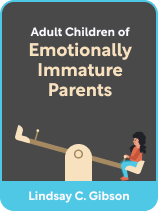

This article is an excerpt from the Shortform book guide to "Adult Children of Emotionally Immature Parents" by Lindsay C. Gibson. Shortform has the world's best summaries and analyses of books you should be reading.
Like this article? Sign up for a free trial here.
Are your parents overstepping some lines? Do you need to set boundaries with your parents?
Setting boundaries with parents can be frightening, but sometimes it’s necessary for your own happiness. In Adult Children of Emotionally Immature Parents, Lindsey Gibson advises how to reframe your relationship with your parents so that you can thrive.
Let’s look at the key to setting boundaries with parents.
Reframe your Relationship
Gibson says that once you understand that your emotionally immature parent likely won’t change, your goal must shift from trying to forge an emotional connection with them, to finding ways to interact with them that aren’t emotionally damaging. The way to do this is by setting boundaries with parents who are toxic. Three strategies can help you manage and create emotional distance from your parent each time you engage with them:
Strategy 1: Enter each interaction with a clear goal. Setting a goal from the outset helps you take control of the interaction and redefine boundaries with your parent. For example, your goal might be to tell your parent that you can only talk on the phone for five minutes because you’re busy, or that you’ll only spend one night with them over the holidays instead of two.
Strategy 2: Focus on speaking your piece clearly and unemotionally. Expressing what you want rather than focusing on your parent’s reaction to you helps honor your authentic needs and feelings. This makes you less likely to be disappointed in their behavior and a step closer to building healthy relationships with others.
Strategy 3: Observe and manage each interaction like an outsider looking in. Observing your interaction with your parent from an emotionally detached place will make you feel less like a powerless participant trapped in an unhealthy relationship. For example, think of yourself as a researcher studying a subject. Silently note, in your head, how your parent’s tone of voice changes, how long they talk to you, and how you’d describe what they say to another person.
Challenges You May Face
Gibson acknowledges that it can be difficult to assert yourself in these new ways. Breaking out of a familiar role, showing your independence, and redefining the terms of your relationship will likely be uncomfortable for everyone involved. Even as you speak your truth, you may hear your parent’s voice in your head saying that if you don’t do things their way, you’ll be sorry.
If, during your interaction, your parent says or does something that makes you feel small, scared, vulnerable, or badly about yourself, that’s a sign that they’ve triggered you emotionally. When this happens, you can recenter yourself by focusing on your observational strategies again. You can also try breathing deeply or repeating a phrase in your head that reminds you to emotionally disconnect like, “Let go.”
If you’re unable to emotionally disconnect, make an excuse to walk away from the conversation. Say you have to go to the bathroom, make a phone call, or leave for an appointment. Taking a break allows you to create emotional space so you can regroup and start again, fresh.
More on Setting Boundaries
Gibson’s strategies all center around setting new boundaries with your emotionally underdeveloped parent. To improve your chance of success, consider this additional advice—and cautions—from experts.
First, consider factors like the amount of time, energy, and resources you’re willing to expend in your relationship, as well as behavior that you’re willing to accept.
Also, make sure that new boundaries you set with your toxic parent are specific and stated clearly. For example, if you want your parent to stop showing up at your home unannounced, say: “It’s okay for you to visit. It’s not okay for you to show up at my house unannounced. I feel strongly about this and will appreciate your respecting my strong preference.”
When you set new boundaries your parent may get defensive, aggressive, or dismissive. These reactions are irrelevant to your goal of protecting your emotional health so stay the course. The more you practice setting boundaries, the easier it will become.
Finally, experts on toxic parents suggest that you carefully choose how and when to engage with them to get the best possible outcome. For example, don’t share information you feel vulnerable about that they can weaponize against you. And interact with them when they’re least likely to be agitated or triggered (for example, if they have a drinking problem but are generally sober in the morning, interact with them in the morning, not later in the day).

———End of Preview———
Like what you just read? Read the rest of the world's best book summary and analysis of Lindsay C. Gibson's "Adult Children of Emotionally Immature Parents" at Shortform.
Here's what you'll find in our full Adult Children of Emotionally Immature Parents summary:
- A look at the damage that emotionally neglectful parents can do to their children
- Strategies to help adults turn their relationship with their parent from toxic to tolerable
- Ways to heal and move forward from childhood emotional neglect






